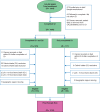Predicted vitamin D status and colon cancer recurrence and mortality in CALGB 89803 (Alliance)
- PMID: 28327908
- PMCID: PMC5789809
- DOI: 10.1093/annonc/mdx109
Predicted vitamin D status and colon cancer recurrence and mortality in CALGB 89803 (Alliance)
Abstract
Background: Observational studies suggest that higher levels of 25-hydroxyvitamin D3 (25(OH)D) are associated with a reduced risk of colorectal cancer and improved survival of colorectal cancer patients. However, the influence of vitamin D status on cancer recurrence and survival of patients with stage III colon cancer is unknown.
Patients and methods: We prospectively examined the influence of post-diagnosis predicted plasma 25(OH)D on outcome among 1016 patients with stage III colon cancer who were enrolled in a National Cancer Institute-sponsored adjuvant therapy trial (CALGB 89803). Predicted 25(OH)D scores were computed using validated regression models. We examined the influence of predicted 25(OH)D scores on cancer recurrence and mortality (disease-free survival; DFS) using Cox proportional hazards.
Results: Patients in the highest quintile of predicted 25(OH)D score had an adjusted hazard ratio (HR) for colon cancer recurrence or mortality (DFS) of 0.62 (95% confidence interval [CI], 0.44-0.86), compared with those in the lowest quintile (Ptrend = 0.005). Higher predicted 25(OH)D score was also associated with a significant improvement in recurrence-free survival and overall survival (Ptrend = 0.01 and 0.0004, respectively). The benefit associated with higher predicted 25(OH)D score appeared consistent across predictors of cancer outcome and strata of molecular tumor characteristics, including microsatellite instability and KRAS, BRAF, PIK3CA, and TP53 mutation status.
Conclusion: Higher predicted 25(OH)D levels after a diagnosis of stage III colon cancer may be associated with decreased recurrence and improved survival. Clinical trials assessing the benefit of vitamin D supplementation in the adjuvant setting are warranted.
Clinicaltrials.gov identifier: NCT00003835.
Keywords: colorectal neoplasm; prospective studies; survival analysis; vitamin D.
© The Author 2017. Published by Oxford University Press on behalf of the European Society for Medical Oncology. All rights reserved. For permissions, please email: journals.permissions@oup.com.
Figures



References
-
- Saltz LB, Niedzwiecki D, Hollis D. et al. Irinotecan fluorouracil plus leucovorin is not superior to fluorouracil plus leucovorin alone as adjuvant treatment for stage III colon cancer: results of CALGB 89803. JCO 2007; 25: 3456–3461. - PubMed
MeSH terms
Substances
Associated data
Grants and funding
LinkOut - more resources
Full Text Sources
Other Literature Sources
Medical
Research Materials
Miscellaneous

